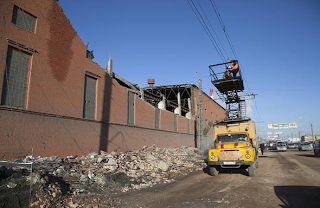Now this is a real life "Kitchen Nightmare".

After the two owners of a Scottsdale-area restaurant were featured on a popular Fox reality show, they created a PR firestorm of the type that is almost unprecedented in the internet age.
It all started when the show applied to be on "Kitchen Nightmares"; a restaurant makeover show hosted by notoriously bombastic British chef Gordon Ramsey. From various reports, the owners had been accused of stealing tips from wait-staff, falsely claiming their baked goods were homemade, and throwing tantrums in the middle of service.
Enter Gordon Ramsey
He does his usual schtick of exposing the problems at the restaurant, trying to get these people to face the realities of the situation. However, unlike most places, these folks not only refuse to recognize their faults, but actually become extremely defensive, resulting in Mr. Ramsey leaving before the completion of the makeover.
Enter Social Networks
After the show aired, the couple went on the offensive, screaming
invective and angry rants against customers, former employees, and
the general public. These are a few of them (some have subsequently been taken down).

They also railed against their Yelp review critics and others who do not give them positive feedback. They are experiencing a major disaster. It doesn't involve flood waters or fire or any act of violence, but this is a serious continuity emergency. Their reputation as a business with integrity is now threatened because of their behavior.
We now live in an age where your angry rants against customers and others can go viral and be seen by millions of people. While it is likely that the notoriety of this incident will give a small spike in business, in the long run, they are looking at almost certain ruin of their reputation and quite possibly, their entire business.
Enter Sanity
The only way for these people to Reverse Disaster is to take a serious look at their own business, and their egos, and see if there is some way to turn it positive.
First, they need to stop yelling on social pages, as it is only making things worse for themselves. The little support they are getting stems from the random people who step out of the woodwork, and probably do not represent the actual positive customer base they enjoy.
Maybe they could find a way to poke fun at themselves, or maybe even temporarily rename the business. Amy's Baking Company, could, for a weekend, be renamed "Anger Between Customers" or something else of the like. Or they could make a "Firebrand" sauce. They need to figure out some way to repair their reputation from this disaster. If they don't, I can't see any way for them to Reverse Disaster.












